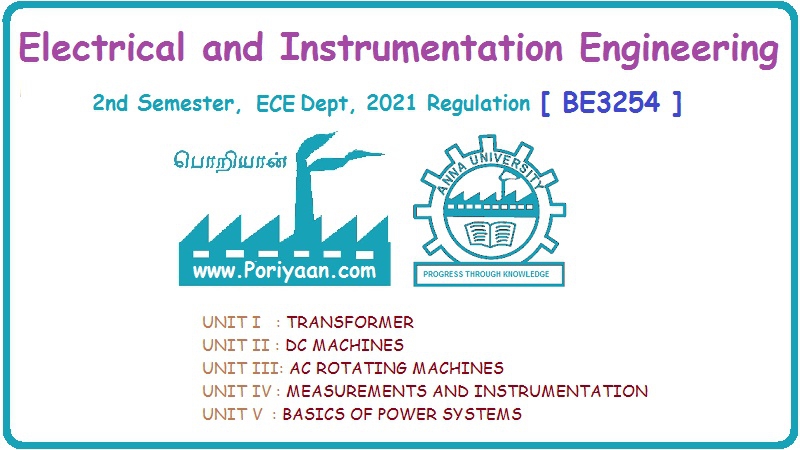Electrical and Instrumentation Engineering: Unit V: Basics of Power Systems
Generation Transmission and Distribution
Main components, Operation Principles
Generating station and distribution system are connected through transmission lines, which are connected to one power system to another
GENERATION TRANSMISSION AND DISTRUBUSTION
The
main components of Power System are:
1.
Generating Station
2.
Transmission lines
3.
Distribution system.
Principles
Generating
station and distribution system are connected through transmission lines, which
are connected to one power system to another. Distribution system is connected
to all loads in a particular area to the transmission lines. From the Fig.5.2
the electric power is 'generated' at
a voltage of '11 kV to 25 kV' which
then is stepped up to the 'transmission
level' in the range of '66 to 400 kV'

As
the transmission capability of a line is 'Proportional'
to the 'square' of the voltages. For
long distance transmission, DC transmission 400 kV is used, and the line is
connected to the AC system at the two ends through transformer are used.
The
first step down of voltage from 'transmission
level' is at the bulk power substation, where the reduction is to a range
of '33 kV to 132 kV' depending on the
transmission line voltage. The next step down in voltage is at the distribution
substation.
Normally
two distribution voltage level are employed.
1.
Primary or feeder voltage (11 kV)
2.
Secondary or consumer voltage (415 V/230 V)
The
distribution system, from the distribution transformer station, supplies power
to Domestic or industrial consumer. This the power system operates at various
voltages levels separated by transformer.
Generating
Stations
Generating
stations feeds energy from one form into another which taps the energy. The
input of electrical energy is generated in hydro, thermal and nuclear power
stations. Electric power is generated at a voltage of 11 to 25 kV which then is
stepped up to the transmission levels in the range of 66 to 765 kV.
Transmission
Stations
The
generated power is transmitted through transmission line. The voltage is
stepped up by using step-up transformer from the sending end substations. It
transmit the voltage 132 kV. From the receiving end substation, the voltage is
stepped down. The first step down of voltage from transmission level is at the
bulk power sub station, where the reduction is to a range of '33 to 132 kV' depending upon the
transmission line voltage.
Distribution
Stations
The
next step down in voltage is at the distribution system. The distribution
system, fed from the distribution transformer stations, supplies power to
domestic, or industrial and commercial consumers.
The
secondary voltage is 415 V for 3 phase and 230 V for single phase.
Electrical and Instrumentation Engineering: Unit V: Basics of Power Systems : Tag: : Main components, Operation Principles - Generation Transmission and Distribution
Related Topics
Related Subjects
Electrical and Instrumentation Engineering
BE3254 - 2nd Semester - ECE Dept - 2021 Regulation | 2nd Semester ECE Dept 2021 Regulation
